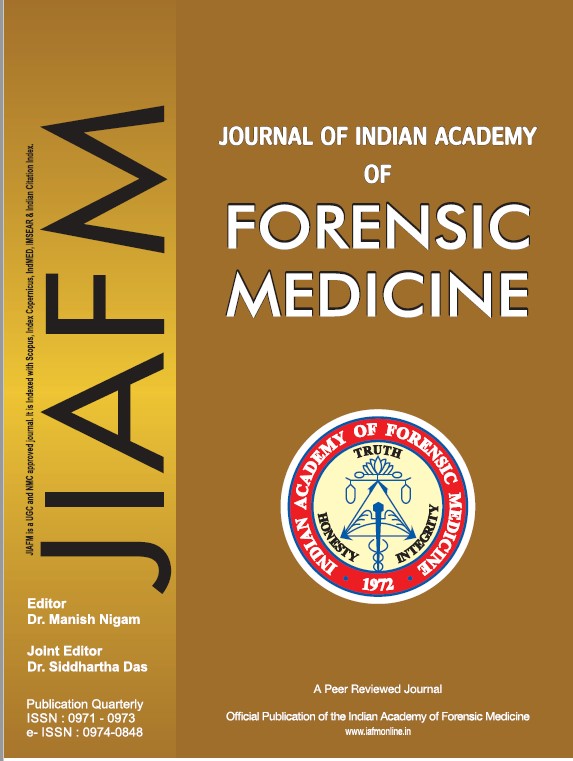Reliability of Sternal Index in Sexual Dimorphism In the Haryanvi Population of India
DOI:
https://doi.org/10.48165/Keywords:
Discriminant function analysis, Hyrtl’s law, Identification, Limiting point, SternumAbstract
Assessment of sex is one of the most vital determinations to make when it is necessary to establish identity from skeletal remains. Sternal index, also known as manubrio-corpus index is an important and frequently studied parameter from this point of view. Current study was an attempt to know the reliability of sternal index in the differentiation of sex in the population of Haryana of Northern India. A total of 200 adult sterna (comprising of 100 male and 100 female sterna) from unidentified subjects of confirmed sex were studied and sternal index (length of manubrium divided by length of mesosternum multiplied by 100) was calculated for each of them. The values were subjected to univariate and discriminant function analysis and a comparative analysis was made. The study was further tested for the applicability of Hyrtl’s law. Though the values of sternal index were found to be significantly higher in females as compare to males, a thorough statistical analysis found sternal index to be an insignificant parameter in the differentiation of sex in the Haryanvi population of India. Hyrtl’s law was also found to be inconclusive with a limited applicability.
Downloads
References
Plavcan MJ. Sexual dimorphism in primate evolution. Am J Phys Anthropol 200; 116:25–53.
Kranioti EF, Iscan MY, Michalodimitrakis M. Craniometric analysis of the modern Cretan population. Forensic Sci Int 2008; 180:111.1–5.
Ferembach D, Schwidetzky I, Stloukal M. Recommendations for age and sex diagnoses of skeletons. J Hum Evol 1980; 9:517–49. 4. Wenzel J (1788) cited by Ashley GT. A comparison of human and anthropoid mesosterna. Am J Phys Anthropol 1956; 3:449-65. 5. Feigal JTA (1837) cited by Jit I, Jhingan V, Kulkarni M. Sexing the human sternum. Am J Phys Anthropol 1980; 53:217-24.
Hyrtl J cited by Dahiphale VP, Baheete BH, Kamkhedkar SG. Sexing the human sternum in Marathwada region. J Anat Soc India 2002; 51:162-7.
Dwight T. The sternum as an index of sex, age and height. J Anat Soc India 1890; 24:527-35.
Strauch M Anatom Untersuchungenuber des Brustbeing des menschen Dissertat Dorpat. Cited by Dahiphale VP, Baheete BH, Kamkhedkar SG. Sexing the human sternum in Marathwada region. J Anat Soc India 2002; 51:162-7.
Krause W. Ueber das weibliche sternum. Int Mschr Anat Physiol 1897; 14:21-6.
Ashley GT. The human sternum - The influence of sex and age on its measurements. J Forensic Med 1956; 3:27-43.
Jit I, Jhingan V, Kulkarni M. Sexing the human sternum. Am J Phys Anthropol 1980; 53:217-24.
Narayan D, Verma HC. Sternal index for male and female in UP. J Anat Soc India 1958; 7:71-2.
Singh J, Singh D, Pathak RK. Gender determination from sterna measurements in Northwest Indian Subjects. J Indo-Pacific Acad Forensic Odontol 2010; 1:20-9.
Gautam RS, Shah GV, Jadar HR, Gohn BJ. The human sternum as an index of age and sex. J Anat Soc India 2003; 52:20-3.


